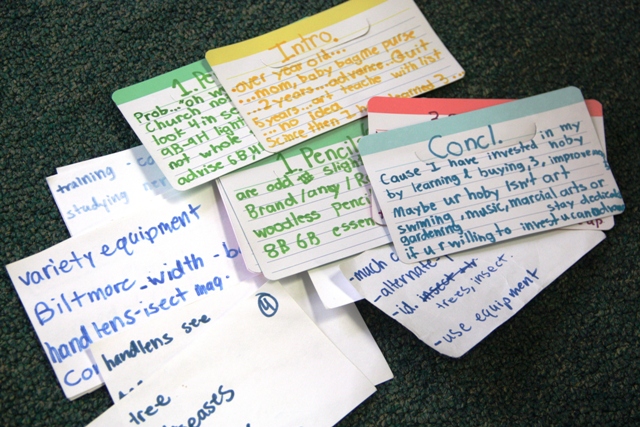In my last post I talked about my issues with finding time in my busy schedule to write, but in this post I want to talk about time in my stories.
One of the biggest areas that trip me up when editing and writing a first draft is the flow of time in the book. Sometimes the season makes a difference, or the time of year in a YA novel where school is involved, but most often it is the time between events. Whether minutes, hours, days, or months, time and the order of events matters.
Time is affected when I edit. If I go chopping out scenes, I lose the time it took for my character to be there. I need to address that time in words.
The best way to handle time is to outline your story first. If you need to rearrange scenes to make the story flow better, you can do this before the scenes are shaped by setting. Your outline doesn't need to be full of every detail, but it does need to have all your important turning points, struggles, and the outcome of your story.
If you are a 'pantser', meaning you write by the seat of your pants, you still know how you want your story to end, even if it's just a feeling you want your character to convey to the reader. You don't even have to write in order, but having a small blueprint will allow you to work out from your central idea. For pantsers, perhaps your outline is on notecards that you can fluidly move around.
Some stories mess with time. These are more difficult to track in edit-mode, so an outline is essential. Maybe 3 or 4 timelines are needed to keep track. Many things from your many plots can happen on the same day, even at the same time. You need to have a master outline where the storylines intersect. your outline might look like a chart in this case. Then you can write your scenes in any order to allow your reader to flashback or discover tidbits as your character goes along that reveal more and more of the plot.
The point is, TIME matters. How your readers follow along with you matters. If you mess with time, then you will lose your readers. Things become incomprehensible.
Unless you mess with it in the right way, leaving foreshadowing and tidbits of clues to pull the reader through the muddled mess to clarity. :)
| http://prosureacquisitions.co.uk/wp-content/uploads/2015/09/fast-forward.jpg |
One of the biggest areas that trip me up when editing and writing a first draft is the flow of time in the book. Sometimes the season makes a difference, or the time of year in a YA novel where school is involved, but most often it is the time between events. Whether minutes, hours, days, or months, time and the order of events matters.
Time is affected when I edit. If I go chopping out scenes, I lose the time it took for my character to be there. I need to address that time in words.
The best way to handle time is to outline your story first. If you need to rearrange scenes to make the story flow better, you can do this before the scenes are shaped by setting. Your outline doesn't need to be full of every detail, but it does need to have all your important turning points, struggles, and the outcome of your story.
If you are a 'pantser', meaning you write by the seat of your pants, you still know how you want your story to end, even if it's just a feeling you want your character to convey to the reader. You don't even have to write in order, but having a small blueprint will allow you to work out from your central idea. For pantsers, perhaps your outline is on notecards that you can fluidly move around.
Some stories mess with time. These are more difficult to track in edit-mode, so an outline is essential. Maybe 3 or 4 timelines are needed to keep track. Many things from your many plots can happen on the same day, even at the same time. You need to have a master outline where the storylines intersect. your outline might look like a chart in this case. Then you can write your scenes in any order to allow your reader to flashback or discover tidbits as your character goes along that reveal more and more of the plot.
Unless you mess with it in the right way, leaving foreshadowing and tidbits of clues to pull the reader through the muddled mess to clarity. :)



No comments:
Post a Comment